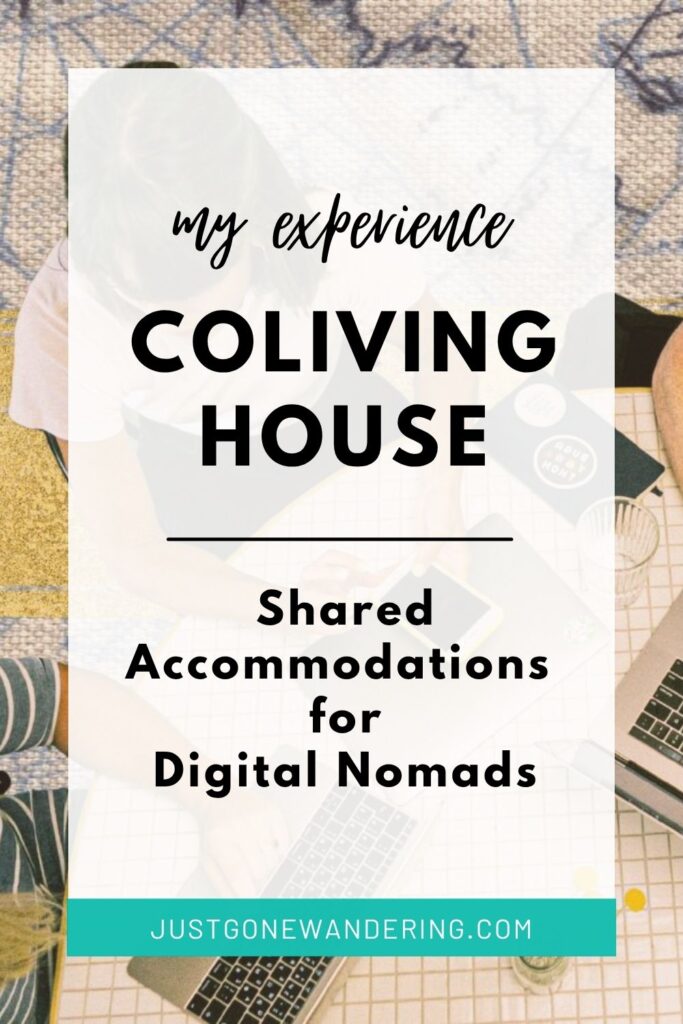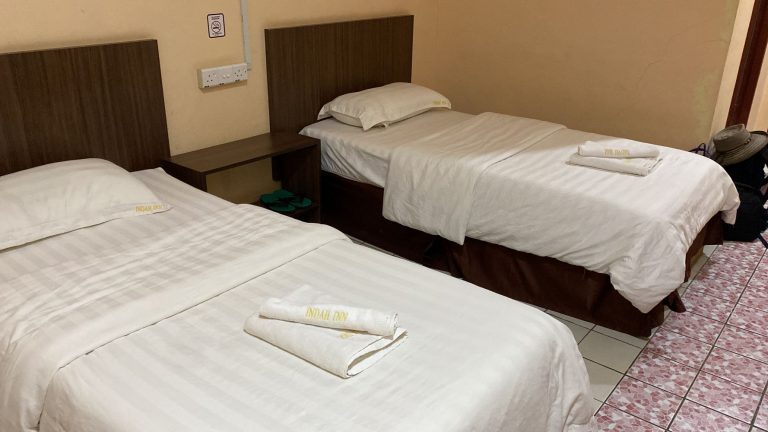What’s it Like Living in a Coliving House? My Experience
At the end of last year I spent a month living in a coliving house in the United Kingdom. While I’ve previously stayed at dozens of hostels all around the world, as well as furnished apartments in cities like Tokyo, Kuala Lumpur, and Da Nang– this was the first time I’ve ever stayed in a coliving house specifically.
A coliving house is shared accommodation for people who (more often than not) are traveling while working. They’re usually digital nomads, or just remote workers in their own countries.
You get your own room (sometimes an ensuite), and then everything else is a shared space, including the kitchen and living areas. Coliving houses also tend to have “coworking spaces” as well, where you can park your laptop and your behind and get some work done alongside your housemates.
This post will talk about my experience staying in a coliving house for a month, including the positives and negatives. I’m hoping it’ll give you a better idea of what it’s really like to stay in one, especially if you’re only used to regular hostels or if you’ve never stayed in shared house before.
Just Gone Wandering is supported by readers! This post contains affiliate links. If you click on a link and buy something, I get a small percentage at no extra cost to you. Your support helps keep this blog running— thank you! Read full disclosure here.
Why I Picked a Coliving House to Stay In
Usually I book hostel stays or a private apartment (mostly through AirBNB or Booking) whenever I want to stay somewhere for a month, but I’d been wanting to try a coliving house for a while. I kept seeing videos on Youtube and Facebook about coliving houses in Europe, and they looked so nice! I was also interested in meeting up with other digital nomads specifically, and they tend to flock to coliving houses, too.
At the same time, I needed to be in England for a bit, and honestly the prices for an apartment were higher than I wanted to pay. Hostels only let you stay max 14 days in most cities, as well. So I thought coliving houses might be a good option. I checked around for coliving houses in England and found one for a really good price, and so I went for it!
(My review of that specific coliving house is coming soon!)
Coliving vs. Hostels
There’s a lot of overlap between hostels and coliving spaces, and in fact some places are BOTH! Really the only difference is the intended customer base. Coliving houses are for people who are working and traveling; hostels are for travelers, who may or may not be working but usually aren’t.
Coliving houses usually want people to stay for at least a week, with some even requiring a month’s base. They also do a bit more “background checking” than hostels– at the very least, they want to know what your job is and where you’re from. Some places do mini-interviews so they can figure out if you’re a good fit with the rest of the guests.
Hostels don’t have a minimum stay requirement, and don’t check their guests much (beyond asking for out-of-state IDs, in the US).
Both coliving houses and hostels have shared spaces, usually a kitchen, laundry room, bathroom and common areas.
Hostels tend to be cheaper than coliving houses because you can stay in a shared dorm, while coliving houses tend to mostly have private rooms available (which costs a bit more).
As for activities, both coliving houses and hostels do things like group outings and tours and such, but hostels tend to have them more regularly and for free as part of your stay. Some coliving houses are more like resorts where you can do yoga classes or cooking classes and such, but they’re an additional fee from your rent.
And now for the pros and cons of coliving houses specifically…

Coliving Positives
We’ll start with the stuff that’s awesome about coliving spaces!
Community
The major benefit is, of course, that a coliving house is full of other people who are traveling and working. Being around other people who have had similar experiences of specifically traveling while working was great. Sometimes when you’re surrounded by people who are on short vacation-type trips, it can be a bit isolating because you can’t just drop everything and go sightseeing all day.
Since everyone in the house was working, we all started on the same wavelength already, which made it easier to connect about other things.
One thing I really liked was that this coliving had weekly community dinners, where someone would volunteer to cook for the house and then we pitch in a bit of money to cover costs. I also stayed during the holidays, so we had an American Thanksgiving dinner, and British Christmas party. It was really fun eating with everyone and trying new foods!
Networking
A coliving house is a good place to network, if that’s what you’re looking for. While there was a wide range of job titles in the house, about half the people at this coliving were in tech in some sort. There were two bloggers (including me), a copywriter, a government worker, and even an actor. It was great to meet other people doing interesting jobs– though obviously I wish there were more bloggers, or even content creators!
Some coliving spaces host meet-ups for local self-employed workers as well, which can be another way to network.
Related: Traveling Solo? Here’s How to Make Friends On the Road
Cost Benefits
Staying at a coliving is (often) cheaper than staying at an apartment by yourself, especially in high cost of living locations like many places in Europe. Plus, there’s a coworking space attached so you don’t have to pay extra for an office space, either.
To do some comparisons specifically for Blackpool in the off-season:
Renting an apartment on AirBNB will run you about $1,600-2000 USD, which is about $54-67/day.
A hotel room will run you about $25-35 USD/day or so, plus you won’t have a kitchen so you’ll need to eat out which can be another $25+ depending on where you eat.
(There doesn’t seem to be any hostels in Blackpool so can’t compare that.)
Meanwhile, the coliving space ended up being about $22/day!
Read more: How Much Money Do You Need to Travel the World?
Flexible Leases
Because you’re renting short-term accommodation, you’re not locked into a year-long lease somewhere. It’s much more flexible for people who want to travel slowly, moving every few months or so. Plus it’s way easier to book a room in a coliving than sign a lease (even a short one) with a rental company or something.

Coliving Negatives
Of course, with the positives come the negatives…
Communal Living Ups & Downs
You’ll be rubbing up against all kinds of personalities, personal habits, other people’s cleanliness issues, etc. etc. You have your own space in the house, but at the very least the kitchen and laundry space is communal, and probably the bathroom as well. Eventually you’ll run into someone who can’t pick up after themselves.
Plus then there’s the usual annoying stuff: someone’s using the washing machine and hasn’t moved their stuff for hours, someone left a burnt pan of rice in the sink and hasn’t cleaned it, etc. The shower is always wet and nobody replaces the toilet paper. That sort of thing.
To make things worse, because people stay longer at coliving houses, it’s more likely you’re going to figure out who’s doing the annoying things, and then you either have to confront them or just suck it up– either of which can create bad feelings between you and the rest of the house. At a hostel at least you’d know the annoying guest is leaving in a day or two.
Privacy
The rooms are private, of course, but depending on the age of the building you may hear your neighbors through the wall. Plus living in close quarters with people tends to encourage chattiness (aka gossip).
If you’re VERY introverted and don’t want to talk to people every day, then coliving isn’t for you. There’s no way to avoid everyone in the house all day every day, so you’ll have to say “hello” eventually.
Running Out of Small Talk
This is such a small thing, but it was surprising to run into! Because you’re booked in the same house with the same people for a week or more, eventually you…run out of small talk topics! In a hostel or even a hotel, guests are coming and going frequently, so you always have someone new to talk to. And of course, if you’re actively sightseeing, then you have a new activity to talk about!
But if you’re working, then you have no new events to discuss. And if you see the same people day after day…eventually it becomes more like a coworker situation where you have bland water cooler chitchat all day. Haha!
Final Thoughts: Living in a Coliving House
I think the positives of a coliving house much outweigh the negatives, though honestly if you’re an introvert I recommend staying in a private hotel instead. You really need to be able to talk to people and not worry over-much about sharing things with strangers– if you’ve stayed in a hostel before and enjoyed it, then you’ll be fine in a coliving house.
If you’re working and traveling, I highly recommend giving a coliving house a try! It was so fun meeting so many other people who were working, just like me, and it was nice not having to explain that I needed to stay inside and make Pinterest graphics for 6 hours.
Save to Pinterest



More Posts About Digital Nomad Life
Best Travel Resources
- 👩💻Stay organized with the Deluxe Travel Planner Spreadsheet
- 🛌Search Hostelworld for budget stays
- ✈️Search SkyScanner for discounted flights around the world
- 😺Join TrustedHousesitters and do petsitting in exchange for accommodation
- 💳Carry Chase Sapphire Preferred for a travel-friendly credit card
- 📱Use Airalo for eSIMs around the world
- 🚙Check DiscoverCars for international car rentals
- 👩💻Snag ExpressVPN to stay safe while browsing the web
- 🧑⚕️Sign up with VisitorsCoverage for trip insurance







